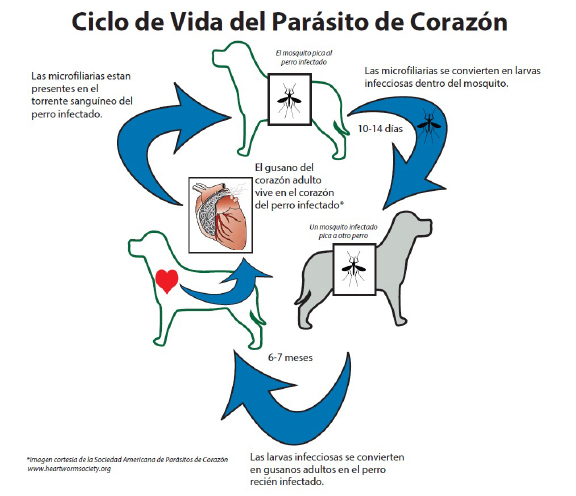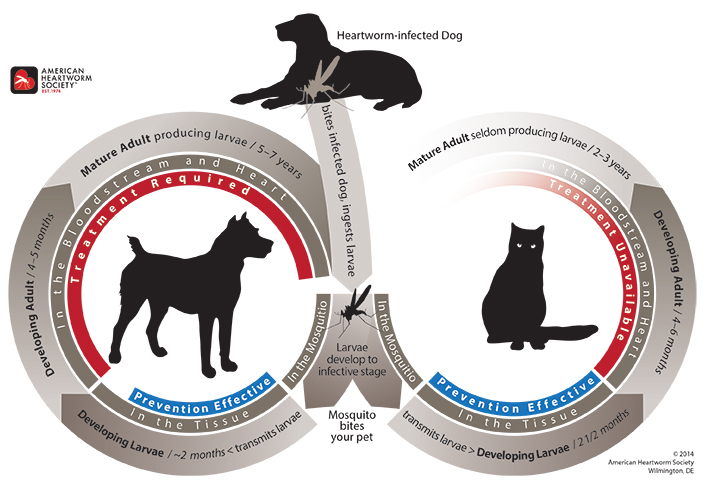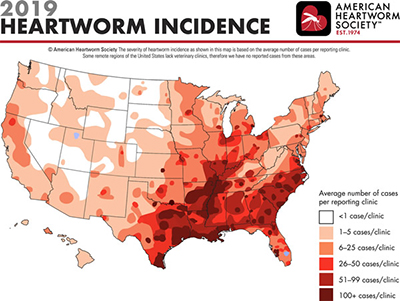Posts Tagged: heartworm
Heartworms/Parásitos del Corazón

En español
Con el verano acercándose, muchos de nosotros pensamos en el riesgo de las pulgas, garrapatas y parásitos intestinales pero no se olviden de los parásitos del corazón! El parásito del corazón es transmitido por los mosquitos y causa daño irreversible al corazón, las arterias, y los pulmones. No existe cura en los gatos y el tratamiento en los perros es costoso, doloroso, y toma un promedio de un año.
Muchos piensan que sus mascotas no están a riesgo de infección en Illinois como tenemos inviernos largos, pero solo se necesita una mordida de un mosquito que lleva el parásito para ser infectado. Aunque su mascota no salga de la casa, los mosquitos pueden entrar por las ventanas, garajes, puertas, etc.
Es importante realizar que la prevención no previene la exposición y aunque los medicamentos preventivos no matan al parásito adulto, se usan para prevenir la madurez de los gusanos. Si el medicamento preventivo se da sin prueba de diagnóstico y el perro está infectado, no solo se quedará infectado pero también puede causar reacción parecida a un shock. En casos inusuales, también puede resultar en fallecimiento de la mascota.

Los gusanos adultos parecen espagueti cocido y pueden llegar a 12 pulgadas. La carga parasitaria puede variar de 1 a 250 gusanos con un promedio en los perros de 15 gusanos! La severidad de los síntomas depende de la carga parasitaria, el nivel de actividad de la mascota, y cuánto tiempo ha estado infectado. Los síntomas más comunes son tos, dificultad para respirar, fatiga, falta de apetito, y pérdida de peso.
El mejor tratamiento es la prevención!
La buena noticia es que existen varios medicamentos preventivos para los perros y gatos! Se necesita una prueba negativa una vez al año (en los perros) para poder recetar el medicamento. Si su mascota no ha tomado la prevención del parásito del corazón de manera constante durante los últimos 12 meses, debería hacer una cita con su veterinario para hacer un análisis de sangre para comprobar un resultado negativo y poder recetar prevención. Hay varias formas de prevención y su veterinario le puede recomendar cual usar basada en su estilo de vida.
In English
With summer approaching, many of us think about the risk of fleas, ticks, and intestinal worms. But don’t forget about heartworms! Heartworms are transmitted by mosquitoes and cause irreversible damage to the heart, arteries, and lungs. There is no cure in cats, and treatment in dogs is expensive, painful, and takes an average of one year.
Many think that their pets are not at risk of infection in Illinois since we have long winters, but it only takes one bite from a mosquito that carries the parasite to be infected. Even if your pet does not leave the house, mosquitoes can enter through windows, garages, doors, etc.
It is important to realize that prevention does not prevent exposure. Although preventative medications do not kill the adult parasite, they are used to prevent the worms from maturing. If the preventative medication is given without a diagnostic test when the dog is already infected, the dog will not only stay infected but the medication can also lead to a shock-like reaction. In rare cases, it can also result in the death of the pet.

Adult worms look like cooked spaghetti and can grow to 12 inches. The parasite load can range from 1 to 250 worms, with an average of 15 worms in dogs! The severity of the symptoms depends on the parasitic load, the pet’s activity level, and how long they have been infected. The most common symptoms of a heartworm infection are cough, shortness of breath, fatigue, lack of appetite, and weight loss.
The best treatment is prevention!
The good news is that there are several preventative medications for dogs and cats! A negative test is needed once a year (in dogs) before the drug can be prescribed. If your pet has not been on heartworm prevention consistently for the past 12 months, you should make an appointment with your veterinarian for a blood test to confirm a negative result so prevention can be prescribed. There are various forms of prevention, and your vet can recommend which one to use based on your lifestyle.
– Dr. Ana Valbuena
Prevention Takes the Bite Out of Heartworm Disease

Throughout this time of quarantine, I have been spending more time outside, as I am sure many of you have, too. Besides the overabundance of cicadas in my neighborhood, currently there seems to be a plethora of mosquitoes looking for a blood meal. Just as we love summer in Chicago, so do mosquitoes. Summer is the time for peak transmission of heartworm disease across the U.S. Heartworm disease is considered endemic in Illinois, and according to the American Heartworm Association, clinics in the Chicago area see an average of 25+ cases per year.

As I sit outside, I think how lucky I am because mosquitoes don’t seem to like me; my wife is not so lucky. Then I wonder if my dog, Oskee, is getting bit as much as we are? And is he getting infected with heartworms?

The importance of prevention makes so much sense once you have a little knowledge about the disease process and how monthly preventive medication works. As described in this short video, the monthly preventive does NOT prevent exposure, but kills off any immature baby heartworms already present in your dog. If the preventives are not given every 30 days, the immature heartworms can mature to juvenile worms before the next dose, thus resulting in heartworm disease.
If you miss a dose or are late giving a dose, give the dose as soon as you remember. While uncommon, an infection may develop within your dog from a single missed dose. Multiple missed doses, especially during peak transmission months, puts your dog at high risk of infection.
The heartworm test performed at annual wellness visits screens for adult heartworms. It takes 6 to 7 months after infection for the heartworms to mature into the life stage detected by the heartworm test. Therefore, if you miss a dose, start up prevention as soon as possible. Then have your dog tested within the next year to be sure that infection did not occur during the unprotected period.
For less than $10/month your pet can be protected. While there is a treatment for heartworm disease, it is more expensive and more painful than monthly prevention. The average cost of treatment for a medium-sized dog is $1,500 vs. $10/month for prevention.
If your dog is not currently on prevention or you need a refill, give us a call today. If you have questions about the different preventive medications on the market, please reach out as we would be happy to discuss your questions and concerns.
—Dr. Drew Sullivan
